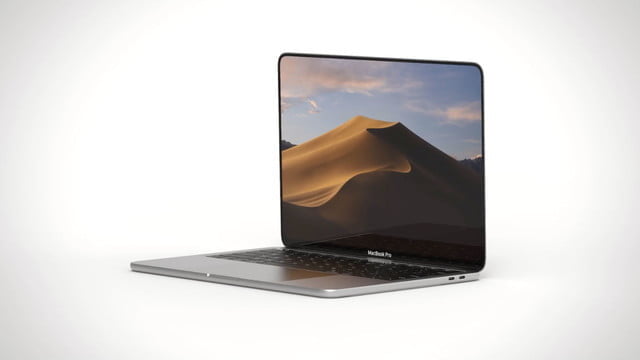Apple’s overhauled MacBook Pro, as well as the next iPad Pro, likely won’t arrive this year as previously expected. Analyst Ming-Chi Kuo, who’s generally spot-on regarding upcoming Apple devices, claims they won’t arrive until the first quarter of 2020.
This new report goes contrary to much of the rumors (including reporting from Kuo himself) that pointed toward a late Fall launch. It should be noted that a Spring launch would be unprecedented in Apple’s typical release cycle for a redesigned MacBook Pro.
Concept by Viktor Kadar
Previous rumors indicate that the new MacBook Pro’s design features an edge-to-edge screen akin to the latest iPad Pro. The screen itself reportedly measures up to 16 inches sporting bezels thick enough to house the Face ID camera.
Another notable feature, according to rumors, is that it ditches the butterfly mechanism used in the current MacBook keyboard. This design has a hinge in the middle to form a “V” that’s prone to collect dust, dirt, and food particles. Despite three generations and Apple’s efforts to eliminate failure rates, butterfly key issues persist.
Apple’s new MacBook Pro will supposedly move from the troublesome butterfly design to a scissor-style mechanism. This scissor design uses glass fiber to create an “X,” promising better durability. Due to the design’s thickness, however, these keys will have a longer travel distance that may not be noticed by some.
On the iPad Pro front, the next generation is rumored to feature a similar triple-camera setup used on the iPhone 11 Pro and iPhone 11 Pro Max. It will also supposedly include a new 3D Time of Flight sensor on the back to enhance photo quality and augmented reality.
A Time of Flight sensor measures the amount of time LEDs and lasers use to bounce off objects. This measurement calculates distance and provides a 3D map of the surrounding area to increase focus speed and clarity. Kuo expects this sensor to provide better results than the TrueDepth camera currently used in the latest iPads and iPhones.
Lastly, in his notes to customers, Kuo has stated the new iPad Pro will rely on a Liquid Crystal Polymer (LCP) Soft Board instead of the traditional printed circuit board.

